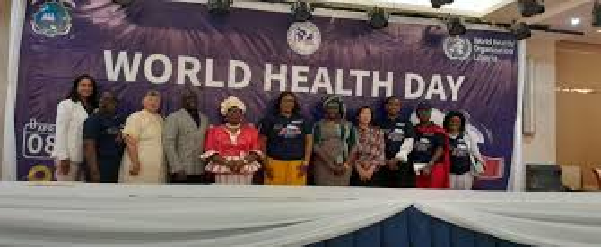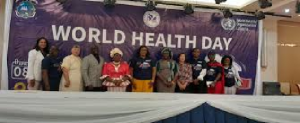Liberia on World Mental Health Day (2024):

By: Samuel G. Dweh—Freelance Development/Human Rights Journalist, Author
+23188661896/+231776583266; samuelosophy@yahoo.com/hafizm.sonnie57@gmail.com
BACKGROUND OF LIBERIA’S MENTAL HEALTH ISSUES
Mental ailment – from consumption of narcotic substances (drugs) and brain tumor from economic or medical factor—has been in Liberia prior to the civil war. But these conditions became rampant during the civil war (1990-2001). During this period, leaders of the Government Forces or rebel factions bent on eliminating each other hauled drugs from other Countries for members of their respective warring factions to consume. This caused them to be “mentally destabilized”; and in a “senseless mood” to wipe out members of an entire ethnic group defending the Head of State, President Samuel Kanyon Doe or the ethnic group backing Rebel Leader Charles Taylor of the National Patriotic Front of Liberia (NPFL) or backing Prince Yomie Johnson of the Independent National Patriotic Front of Liberia (INPFL).
The economic factors refer to some persons consuming excessive alcohol on frustration of being unemployed, or being politically removed from the only job they depend on to support their families.
The medical factor refers to a quack in the medical profession, who download expired or substandard medical liquid into the belly of a pregnant mother, which automatically causes brain rupture of her unborn child.
The civil war ended over twenty years ago, but all parts of Liberia are littered with soldiers of the former government and rebel group who drugged themselves or were drugged by their colleagues on order by the leader of the warring group.
The number of mentally ill persons increases during each post-war Liberian Government—of Charles Taylor (2001-2003), Ellen Johnson Sirleaf (1996-2017), George Manneh Weah (2018-2023), and Joseph Nyumah Boakai (2024—still the President until 2029), although the situation became worse during the Presidency of George Manneh Weah (2018-2023. He was lenient with drugs smugglers and operators of ghettos (drugs sale and consumption points). Probably, his weakness to fight drugs was due to his drug addiction life prior to his ascendency to the national presidency.
At the launch of the Rehabilitation Program for drug-addicted Liberian youths (called At-Risk Youths) on the 30th of June, 2022, President Weah confessed his former drug addiction life. The event was at the EJS (Ellen Johnson Sirleaf) Ministerial Complex in Congo Town. The writer of this write-up attended the program, took several photos, and posted them on his Facebook.
“When my father died, my suffering started, and I got involved into drugs. But I didn’t stay in drugs for long,” then President George Manneh Weah announced to the audience of Liberian youths and other Liberians, representatives of the United Nations (main sponsor of the Rehabilitation Program), representatives of the of the European Union, and representatives of Liberia’s other International Partners.
In 2023, a container with hundred million worth of drugs was uncovered at the Free Port of Monrovia through America’s surveillance satellite over Liberia. Some reports said the foreigners who brought the drugs into Liberia were some of President Weah’s “business partners”.
During the Presidential and Legislative elections in 2023, candidate Joseph Nyumah Boakai lamented on the influx of drugs into the Country, and told the Nation the fight against drugs will be one of his priorities when he becomes President.
He is now the President, but drugs from other Countries are ‘freely marching’ into Liberia’ (through smugglers), especially through the land borders. There are reports of top officials of the Liberia Drug Enforcement Agency (LDEA), appointed by President Boakai, are in “business partnership” with foreign drugs smugglers who come regularly into Liberia, and those who are based in Liberia. The fist fight between LDEA leader Abraham Kromah and his Deputy (surname Fadiga) in June, 2024, was based on one of them attempting to sideline the other to have the biggest voice on interaction with foreign drug cartel in Liberia above the other.
The President suspended the Leader Kromah and the Deputy, and appointed a caretaker while he searches for a new LDEA boss. There is another report that one of President Boakai’s sons is hooked to drugs. With this, conscience—the “police officer” Creator God has placed into every human being often reminds President Boakai: “With your son on drugs, you are not the right channel for drug-related message for Liberia.”
THE 2024’S WORLD MENTAL HEALTH DAY EVENT
The indoor program was at the E.S. Grant Mental Health Center, in Paynesville. The event started with a mental health-related Drama, titled “Catch Method”, by students of Grand Bassa County’s University.
“The Catch Method tells everybody here to immediately report any symptoms of mental problem in another person, shown through the person’s action at home, workplace, or another place, to a health practitioner,” Mr. Lee D. Robert, leader of the Drama group, announced to the audience.
The next performance was dancing. This was done by being-rehabilitated youths in the care of the E.S. Grant Mental Health Hospital. Why they were performing, one of their female colleagues started screaming, “I want go my ma, I want go to my ma…” She raced toward the hall with participants, but met a barricade of security men on duty. They took her back to shed she had come from.
Next was the National Emergency Public Institute (NEPI) on its “success stories” of how it had transformed drug addicted youths in various places. Some of the transformed youths were on the stage with NEPI’s representative.
One of the transformed youth said: “I was deep into drugs in the Zinna Hill Community on the GSA Road, but NEPI persuaded me and my colleagues to leave drugs, so they can give us work that will give us money. I am now working.”
Another transformed youth said: “I was in drugs for ten years, but NEPI connected to me and told me about the value of my life. If you want to succeed in life, listen to the advice of your parents.”
Another NEPI-transformed youth raced to the stage and began talking in a gruffly tone common with majority of members of the drug-addicted community. “The First Lady of the Republic of Liberia had been engaged to be the Guest Speaker at this occasion, but she is absence,” the Master of Ceremony announced to the audience.
The announcement by the M.C. was followed by remarks by the Head of the E.S. Grant Mental Health Hospital, the Executive Director of the State-owned John F. Kennedy Memorial Medical Center (), Ministry of Health, and other institutions connected to mental health issues in Liberia.
The Head of the E.S. Grant Mental Health Hospital, Dr. Benjamin Harris, praised the Government of Liberia, and Liberia’s International Development Partners for their supports to the Hospital.
“One of our foreign partners is Medecins Sans Frontiers, France’s global health support Organization,” he said.
However, he lamented on some of the financial constraints being experienced by the Hospital in recent times. The next speaker was Madam Linda Birch, Chief Executive Officer of the State-owned John F. Kennedy Memorial Medical Center.
“As leaders, we must first consider our mental health status before we think about others,” she cautioned.
A female, representing the “Mental Health Champions of Liberia”, declared: “Mental health is under-discussed, and under-prioritized at various workplaces, and under-reported in various professional sectors including the media profession.”
The Ministry of Health was represented by Madam Yassah P. Lavela, Deputy Coordinator, and Head of the Ministry’s Delivery Unit.
“Every Liberian home is plagued with drugs. The civil war and Ebola pandemic in Liberia contributed immensely to mental health problems across the Country,” she said.
The Armed Forces of Liberia (AFL) was represented by Lieutenant Colonel Dr. Joseph B.N. Kowo, Jr., the AFL’s Assistant Chief of Staff for Health Services.
“The Armed Forces of Liberia is not left out in mental health issues. We have had suicide in the AFL. Some members of the AFL’s troop that come from war zones in other Countries where they served as peace keepers have shown some forms of mental illness,” he informed the audience.
The International NGO was represented by The Carter Center’s Office in Liberia. Mr. Mark Mulbah represented The Carter Center.
“There have been achievements over the years, but there have also been challenges,” Mr. Mulbah noted.
Mr. Nathaniel Sando, representing the Local NGOs—collectively called the Civil Societies Organizations (CSOs) of Liberia said: “Substance abuse damaging Liberia’s future. Ghettos are all over the Country.”
Mr. Albert T.S. Harris, a Psychiatrist, represented the United Methodist University.
“The United Methodist University is the only educational institution offering degree in mental health education in Liberia,” he began his remarks. “The leaking fountains at the E.S. Grant Mental Health Hospital promote mental health problems. I am being blunt about this, for the management team to take corrective action,” he added.
The Keynote Speech was by Mr. Bakary Sonko, a Gambian Psychiatrist working at the National Public Health Institute of Liberia (NPHIL) He is also official of Africa’s Center for Disease Control (CDC)
His speech was based mostly on empathy by employers and leaders of workplaces.
EXCERPTS FROM HIS KEYNOTE SPEECH:
“Stress, anxiety, and depression are not just personal burden; they can impact workplace dynamics, leading to degrease in productivity, increased absenteeism, and higher employee turnover
By cultivating the culture of mental health awareness, and empathy, we can foster an environment in which individual thrive, innovation flourishes, and an overall organization health improves. This is not just a philosophical preposition; it is a practical strategy for creating a workplace where people are motivated, productive, and engaged
An employer or a leader in the workplace should lead by example. You cannot tell the employee or your junior colleagues to come to work early, but you often come late to work.”
At the end of his speech, he relayed pledge by the Africa’s Center for Disease to always empower Liberia’s health environment to ably take care of mental health issues in the Country.
He also talked about the Africa-based CDC’s plan to absorb medically qualified Liberians into the Managerial Board of this African Regional Health Hub.
The program ended with the event organizers’ offers of sumptuous Snacks, fried rice, and cooked Liberian foods (cassava leaf with rice) to participants at the program.
Will Liberia, through her Government, ignore factors (drug addiction, quack doctors administering treatment in hospitals, politically motivated dismissals of workers in public and private workplaces, etc) that engender mental health problems, and sing the mental health-related “song” only on World Mental Health Day? Liberia’s International Development Partners—France’s MFS, America, Center for Disease Control, and the United Nations—are keenly watching!
The post Liberia on World Mental Health Day (2024): appeared first on Global News Network Liberia – Global News Network.



